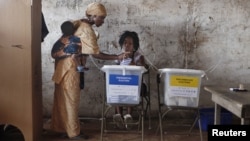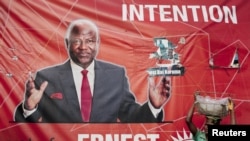FREETOWN —
Vote counting is underway in the West African nation of Sierra Leone after a calm, but enthusiastic, day of polling for presidential, parliamentary and local elections.
Polling stations opened more or less on time to long lines of voters in the capital, Freetown, Saturday.
Voters said peace and progress were on their minds.
"I've got to be here to put things right. To put things right here, we have to vote for the right person in the right place and I've got to be a part of that," said a voter who gave her name as Fona.
"We are looking for progress in our country. That is my main purpose of coming here to vote. I am quite sure this vote is going to be peaceful and we are hoping nothing like chaos will happen here," said voter John Camara.
A third voter, Peter Beckley, expressed hope for a brighter future for Sierra Leone.
"I believe this is the only way I can express what I wish for this country, a better life for everybody especially the fact that we have actually lagged behind as far as education is concerned," he said. "There are a lot of unemployed youths on the streets. People don't have the basic necessities that they really deserve to get life going."
The election is a key test for Sierra Leone as it tries to prove its democratic credentials and shake off a violent past, now ten years since the end of a brutal decade long civil war.
The European Union's chief election observer, Richard Howitt, said that turnout looked high. He said he had talked to voters who had gotten in line as early as 2 a.m.
"Huge enthusiasm, a good atmosphere," Howitt noted. "If there's any ill-temper, than it's really just people being impatient for waiting quite long times to exercise their [right to] vote."
Violence has erupted during previous elections. Police and military manned roadblocks in the capital and were positioned throughout polling stations on Saturday.
Civil society groups set up a "Citizen's Situation Room" to monitor the voting environment in real time via text messages from 9,493 observers, one for each polling station.
Incumbent president Ernest Bai Koroma is running for a second five-year term in office under the banner of the All People's Congress, or APC. He voted amid cheers from supporters at a polling station in Freetown.
Koroma told reporters that he is pleased by the "huge turnout" and the peaceful process up to this moment that he hopes will continue. He says this is a democratic process and "when the people speak we have to listen."
Koroma's top competition is opposition candidate Julius Maada Bio of the Sierra Leone People's Party or SLPP. Bio is a former military leader who stepped down just months after a 1996 coup. He also cast his ballot in the capital, Freetown.
"I have said always that we want a clean election, an election whose results all of us can afford to live with, one that is not controversial, one that is transparent, one that is free of violence … Definitely, I am ready to live with a result that represents the wish and aspirations of the majority of people of this nation," he said.
There is concern that disputes over results, in particular unofficial partial results released by the media and political parties, could spark violence. The National Election Commission has 10 days to announce final results.
If none of the nine presidential candidates wins 55 percent of the vote, a run-off is planned for December 8.
Polling stations opened more or less on time to long lines of voters in the capital, Freetown, Saturday.
Voters said peace and progress were on their minds.
"I've got to be here to put things right. To put things right here, we have to vote for the right person in the right place and I've got to be a part of that," said a voter who gave her name as Fona.
"We are looking for progress in our country. That is my main purpose of coming here to vote. I am quite sure this vote is going to be peaceful and we are hoping nothing like chaos will happen here," said voter John Camara.
A third voter, Peter Beckley, expressed hope for a brighter future for Sierra Leone.
"I believe this is the only way I can express what I wish for this country, a better life for everybody especially the fact that we have actually lagged behind as far as education is concerned," he said. "There are a lot of unemployed youths on the streets. People don't have the basic necessities that they really deserve to get life going."
The election is a key test for Sierra Leone as it tries to prove its democratic credentials and shake off a violent past, now ten years since the end of a brutal decade long civil war.
The European Union's chief election observer, Richard Howitt, said that turnout looked high. He said he had talked to voters who had gotten in line as early as 2 a.m.
"Huge enthusiasm, a good atmosphere," Howitt noted. "If there's any ill-temper, than it's really just people being impatient for waiting quite long times to exercise their [right to] vote."
Violence has erupted during previous elections. Police and military manned roadblocks in the capital and were positioned throughout polling stations on Saturday.
Civil society groups set up a "Citizen's Situation Room" to monitor the voting environment in real time via text messages from 9,493 observers, one for each polling station.
Incumbent president Ernest Bai Koroma is running for a second five-year term in office under the banner of the All People's Congress, or APC. He voted amid cheers from supporters at a polling station in Freetown.
Koroma told reporters that he is pleased by the "huge turnout" and the peaceful process up to this moment that he hopes will continue. He says this is a democratic process and "when the people speak we have to listen."
Koroma's top competition is opposition candidate Julius Maada Bio of the Sierra Leone People's Party or SLPP. Bio is a former military leader who stepped down just months after a 1996 coup. He also cast his ballot in the capital, Freetown.
"I have said always that we want a clean election, an election whose results all of us can afford to live with, one that is not controversial, one that is transparent, one that is free of violence … Definitely, I am ready to live with a result that represents the wish and aspirations of the majority of people of this nation," he said.
There is concern that disputes over results, in particular unofficial partial results released by the media and political parties, could spark violence. The National Election Commission has 10 days to announce final results.
If none of the nine presidential candidates wins 55 percent of the vote, a run-off is planned for December 8.





